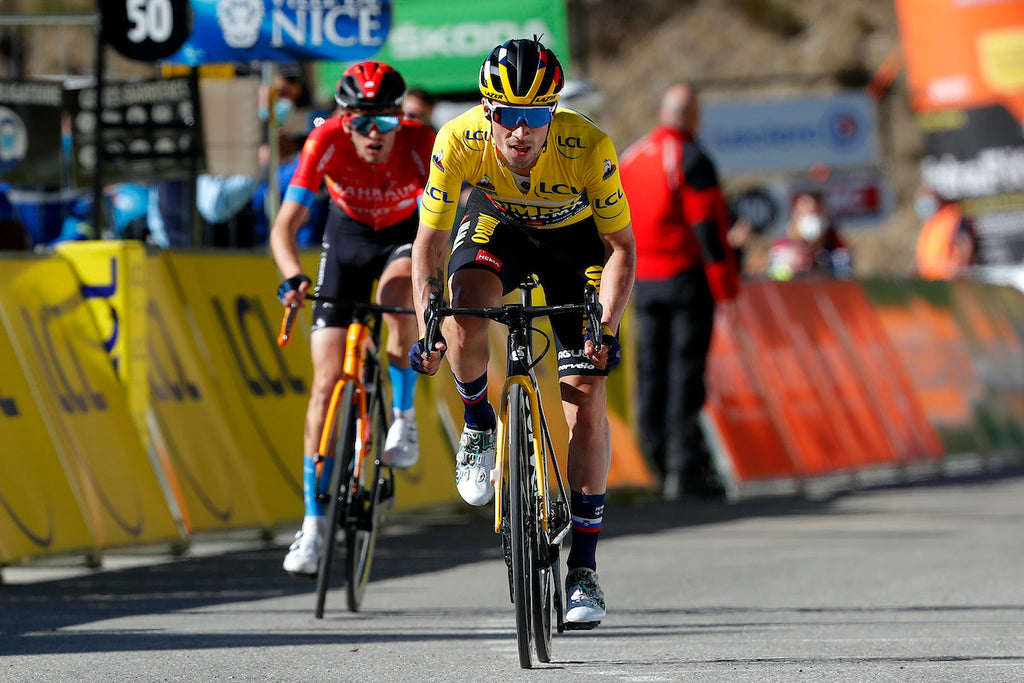In my own particular view of cycling, I find Primoz Roglic the simplest character of all those currently winning leader's jerseys.
I imagine him having a group of friends who would fit in naturally with mine. I see him as a lover of all sports, like the rest of his colleagues, without seeming an outcast to any of them. As a weekend warrior who rides for the simple pleasure of doing sport, no matter which sport it might be. I imagine him as someone who likes to test himself but, besides his competitive spirit, knows how to maintain a healthy balance, because he knows what losing means.
In my mind's eye, I have an image of him from 2011 during a mountain bike race, wearing trainers, fat socks and an old, baggy jersey from the Française de Jeux team. He rode in a strange position on a cheap bike, rocking the purest Sunday style, all borrowed from some neighbours.
This representation of Roglic has become even more clear to me during this year's Vuelta a España, and it has been confirmed by his "what a worry, huh?" answers when asked about the strategy for the race. His ability to relativise success and defeat brings many of us back from the trance that we find ourselves amid the excitement of the race, reminding us that there are clearly more important things to worry about than Grand Tours.
Perhaps because of this, he has an exceptional ability to bounce back from failure almost immediately. "First-world problems", he says with irony — giving his responsibilities their due importance.


Above: Wout Van Aert and Primož Roglič in a moment of relaxation in the last Tour de France (photo: Pauline Ballet) / Below: In the 17th stage of La Vuelta 2021, Roglič and Egan Bernal are in the break of the day, which would end with the Slovenian as the new race leader (photo: Charly López / Unipublic)
Roglic, unlike the majority of the peloton, did not grow up on a bicycle, as we all know. After failing to make it as a ski jumper, he decided to try cycling in his early 20s. He invested €3,000 in a bike and started contacting people close to cycling via email, asking them what he needed to do to become a professional cyclist. Until then, he had only cycled 2,000 kilometres per year. Maybe he should start by improving that, they suggested. He had to learn everything at once, from knowing how to dress and eat on the bike, to learning to ride in the peloton.
In an interesting interview in the American magazine Bicycling, it transpires that he learnt to pick himself up, physically and morally, from the number of times he struggled in his fast introduction to cycling. He joined the Adria Mobil team at the age of 23.
He may not be the best tactician in the peloton but he makes up for this with his "who does not risk, does not win" attitude. It’s the instinct that led him to follow the wheel of Egan Bernal 60 kilometres from Lagos de Covadonga, with a courage that allows him to not think twice and leave all his team behind. His skills on the bike do the rest.
He has not been immersed in cycling culture the same way as others who have been on two wheels since they were children. All at once he had to learn the laxity of fair play – an eternal debate in the sport – and the unwritten codes of the peloton. For example, the hierarchy of the group and knowing how to find his place in it, how respect works within the peloton, and all of the other things that are learnt at “cycling school”.
With this being said, he likely would not understand the unfounded criticism that rained down on him on the seventh stage of Paris-Nice 2021 when he overtook young Gino Mäder, who survived the breakaway, at the finish line. Mäder, on the verge of tears, saw his chance to make himself known to the world slip away against an unbeatable Roglič, who took his fiftieth victory with that win.

The Slovenian rider passes Gino Mäder a few metres before the line in the seventh stage of Paris-Nice 2021 (Photo: Bas Czerwinski/AFP/Getty)
The uniqueness of the Slovenian is that, despite being one of the best cyclists in the world, his day-to-day life is still a lesson. Therein lies his greatest merit: achieving success with a half-learned lesson.
Despite his two overall victories in the Vuelta a España, fourteen Grand Tour stage wins since 2016, wins in Tour de Romandie, Vuelta al País Vasco, Tirreno-Adriatico, Liège-Bastogne-Liège and the medal in the Olympic time trial, Roglic reflects to Bicycling: "Still when I look back, if I had known how hard it was… Maybe I would never have started cycling. But since I didn’t know it..." he pauses. "Well, I had nothing to lose. I had to try it and see for myself". He concludes: "I had to learn everything too fast. And honestly, it's very difficult because, yes, you fall a lot of times in the feed zone, here and there. But if you want to continue, you have to overcome”.
And if he has lessons to learn, we learn every day with this ever-changing champion: to find the opportunity while overcoming the obstacles and to live with temperance both in glory and defeat. And he prays for one last wish: "to go down in history not for what I won, but for what I fought for".
Primoz Roglic will always be on my team.






























